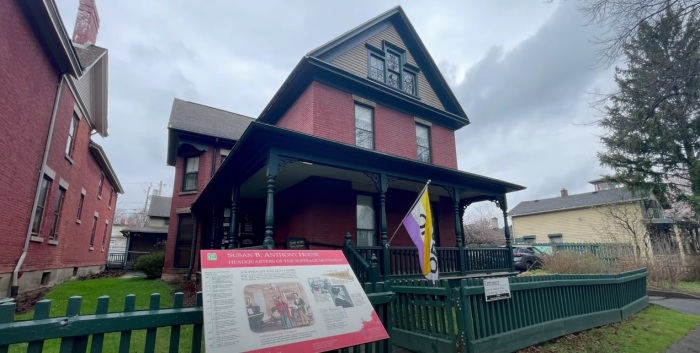‘Full circle’: Susan B. Anthony's historic NY home now serves as polling place

The historic New York home of women’s rights activist Susan B. Anthony, who was arrested in the 19th century for illegally voting, has been designated as an official polling place.
The Rochester-based historic site, located in a neighborhood named after Anthony, had approximately 700 people show up last Saturday for early voting, The New York Times reported.
In 1872, Anthony voted in the presidential election and was later arrested by authorities who came to her home, as state law prohibited women from taking part in the political process.
One of the voters waiting in line to vote at the Anthony house told the outlet that it felt “very full circle,” adding that it was “just so cool to be able to vote at the place where Susan B. Anthony was arrested for voting.”
According to Deborah Hughes, president of the Susan B. Anthony Museum & House, her organization came up with the idea of the house being a polling site in 2020 when New York introduced early voting in presidential elections.
The effort faced some hurdles in securing the designation as an official polling location, reported the NY Times, with one issue being the lack of space at the two-story historic home.
After the historic site built a carriage house with two exits on the property, the Monroe County Board of Elections finally designated it as a polling location earlier this year.
“The point wasn’t to celebrate this great icon of Susan B. Anthony,” Hughes told the NY Times. “It was about the cause to which she dedicated her whole life and that we believe is still essential and important. This is right in line with our mission.”
Born in 1820 in Adams, Massachusetts, Anthony was inspired by her Quaker beliefs to pursue civil rights causes, including the abolition of slavery and women’s equality.
Following her arrest for illegally voting in the 1872 election, Anthony was put on trial, with a judge finding her guilty in June 1873 and fining her $100, which she reportedly refused to pay.
Although Anthony died 14 years before the passage of the 19th Amendment in 1920, which guaranteed women the right to vote, the measure was often nicknamed the “Susan B. Anthony amendment” in her honor.
“As such, it stood as a tribute to Anthony’s integrity, determination, and influence,” wrote the National Women’s History Museum. “The fruits of her labor would enable many women to play an integral role in shaping U.S. society for generations to come.”





























